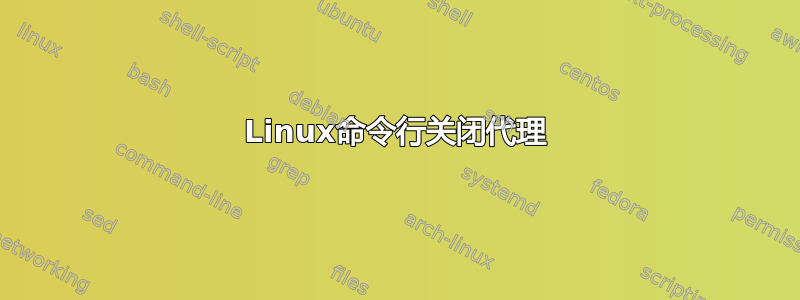
当我在 Ubuntu 中使用命令行终端时,您能向我展示关闭代理的命令行吗?
答案1
正如另一个答案所说,有些程序根本不查看系统,您可能需要单独设置它们。例如,wget 有许多代理选项,可用于在执行期间忽略或调整环境代理配置。以下是可以设置系统代理的多个区域。
- 我的系统看起来如何,请注意,您必须更改您的网络环境的指定系统配置。
一些 Linux 系统使用 /etc/environment
$ cat /etc/environment
PATH="/usr/local/sbin:/usr/local/bin:/usr/sbin:/usr/bin:/sbin:/bin:/usr/games"
http_proxy="http://192.168.1.250:8080/"
ftp_proxy="ftp://192.168.1.250:8080/"
https_proxy="https://192.168.1.250:8080/"
没有统一的单一设置其他使用环境
$ env | grep -i proxy
NO_PROXY=localhost,127.0.0.0/8,127.0.1.1
http_proxy=http://192.168.1.250:8080/
FTP_PROXY=ftp://192.168.1.250:8080/
ftp_proxy=ftp://192.168.1.250:8080/
all_proxy=socks://192.168.1.250:8080/
ALL_PROXY=socks://192.168.1.250:8080/
HTTPS_PROXY=https://192.168.1.250:8080/
https_proxy=https://192.168.1.250:8080/
no_proxy=localhost,127.0.0.0/8,127.0.1.1
HTTP_PROXY=http://192.168.1.250:8080/
我将检查 ~/.bashrc 以便在系统启动时自动应用设置。
$ man env
$ man set
$ # The file section near the end of the bash manual.
$ man bash
FILES
/bin/bash
The bash executable
/etc/profile
The systemwide initialization file, executed for login shells
/etc/bash.bashrc
The systemwide per-interactive-shell startup file
/etc/bash.bash.logout
The systemwide login shell cleanup file, executed when a login
shell exits
~/.bash_profile
The personal initialization file, executed for login shells
~/.bashrc
The individual per-interactive-shell startup file
~/.bash_logout
The individual login shell cleanup file, executed when a login
shell exits
~/.inputrc
Individual readline initialization file
答案2
假设您正在谈论典型的命令行软件和 HTTP 代理:
大多数命令行工具都会从环境变量中获取该信息HTTP_PROXY,因此在运行命令之前:
unset HTTP_PROXY
软件/平台之间可能存在一些差异,您可能unset http_proxy也需要这样做。
请注意,许多程序将此信息存储在其自己的配置文件中,并且可能会忽略环境,因此您必须根据具体情况解决这些问题。
答案3
您可以在 bash 中一次设置或取消设置所有变量:
$ export {http,https,ftp}_proxy="http://proxy-server:port"
$ unset {http,https,ftp}_proxy
$ export {HTTP,HTTPS,FTP}_PROXY="http://proxy-server:port"
$ unset {HTTP,HTTPS,FTP}_PROXY
您还可以添加快捷方式~/.bashrc:
# Set Proxy
function setproxy() {
export {http,https,ftp}_proxy="http://proxy-server:port"
export {HTTP,HTTPS,FTP}_PROXY="http://proxy-server:port"
}
# Unset Proxy
function unsetproxy() {
unset {http,https,ftp}_proxy
unset {HTTP,HTTPS,FTP}_PROXY
}
不要忘记重新加载.bashrc:
$ . ~/.bashrc
或者
$ source ~/.bashrc
更多详情请访问地狱黑客。
答案4
export http_proxy=
你可以通过运行来检查它们是否消失了
echo $http_proxy
它应该返回一个空白行


